In 2020, All for KIDZ, producers of NED's Kindness Adventure put in a well at Fairmile School. Here is the Fairmile School story . . . Today Fairmile School is run by Fern Eshuchi, a woman with a quiet voice and a BIG heart for autistic kids in Kenya. Fern first learned about Autism in England while working at a mental health hospital. Then she looked around her homeland in Kenya and wondered where the autistic kids were. They were being ignored.
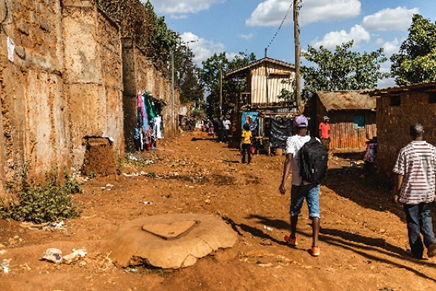
Fairmile School is adjacent to the slums in Nairobi
In 1987, Fern determined to start a school for these special need students. She went to the government to register “Fairmile School”, named after the school in England where she did her teaching practice. The government gave her 3 days to find a compound before she could even register. She went searching. A flyer led her to a piece of property that backed up to the slums. She was so determined to make this happen, that she didn’t even realize that she had hurt her leg while running to the site. She ended up signing the document to buy the property to start her school – then she dealt with her leg injury – it was broken! NED was impressed “That’s true NEVER GIVE UP attitude!”
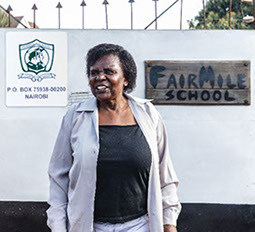 “The reason I’m so involved with Autism is because it found me before I found it. Why autism…Because it’s there and there is a lot of it.”
“The reason I’m so involved with Autism is because it found me before I found it. Why autism…Because it’s there and there is a lot of it.”
-Fern Eshuchi, Founder and Director of Fairmile School
Today, Fairmile is a day school with 30 autistic students. This modest school has a building with classrooms, a sensory and play therapy room, and eating and meeting areas. They grow some vegetables and mushrooms on location to help with meal provisions for their students, staff and families. Their mission is to provide quality service to children with special needs through a welcoming home at Fairmile.
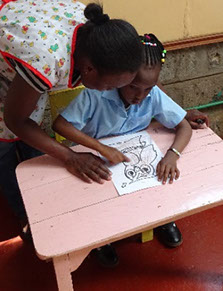 Their innovative approach to service delivery in the special needs area works to empower parents, teachers and the community to live in a world free of stigma and full of learning opportunities and growth. Fairmile’s goal is to ensure that more children are afforded an opportunity to be integrated in the mainstream community as soon as possible so they can contribute to their community. Families find a professional shoulder to lean on. The community develops an accepting and a tolerant approach to the needs of special needs families and gives them an opportunity to improve their quality of life.
Their innovative approach to service delivery in the special needs area works to empower parents, teachers and the community to live in a world free of stigma and full of learning opportunities and growth. Fairmile’s goal is to ensure that more children are afforded an opportunity to be integrated in the mainstream community as soon as possible so they can contribute to their community. Families find a professional shoulder to lean on. The community develops an accepting and a tolerant approach to the needs of special needs families and gives them an opportunity to improve their quality of life.
30 autistic children and their families are supported at Fairmile School
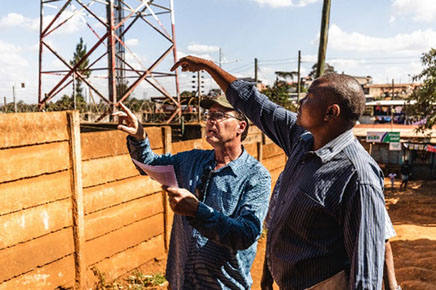
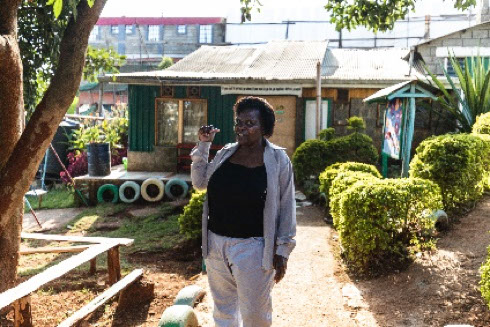
Fern’s school building has a classroom, play therapy room and an eating area
Fairmile works against extreme challenges to be self-sustaining. An abundance of water was one of their greatest needs as water is needed for their programs and to sustain their organic gardening, which plays such a vital role in the students’ growth and development.
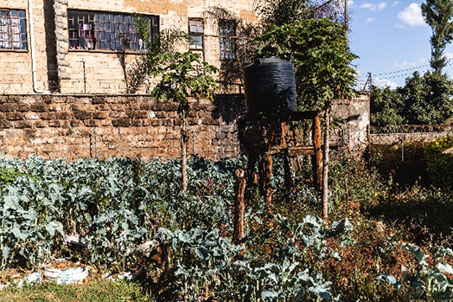
Having their own water source on their property has been a big boost to Fairmile School. After a fracture trace analysis was completed All for KIDZ drilled the well. The water that was struck was clean and abundant. This well has changed the lives of so many at Fairmile by providing abundant clean water for drinking, cooking, washing, toilets, and gardening - making them fully sustainable.
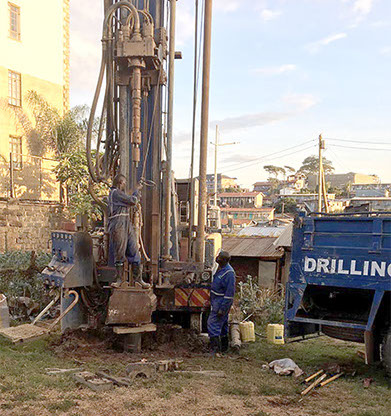
THE INSTALL
On April 11, 2019, heavy machinery arrived at Fairmile School to begin drilling the borehole (well). The process was completed in 5 days. The water was tested and deemed safe for consumption and yield from that location was 24,000 liters (6,340 gallons) per hour and will replenish within 1 hour.
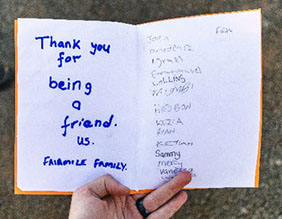
Want to help?
If you are inspired to help with the need for clean water, we encourage you to give toward a water organization of your choosing. If you don’t know where to start, have a look at Charity: Water, Splash, or Water.org.
All for KIDZ installed a well in Anne Odhiambos's village in 2017. Ned and our performers accepted an invitation from Anne Odhiambo, the head teacher at Bidii Primary school, to visit Kenya. On our visit, Anne took us to see her childhood home in Kathonzweni. We drove from Nairobi and all along the way we saw women and children walking and riding bikes. Each of them had the same mission– carrying yellow gerry cans to collect water for their families. Anne recalled her childhood chore of gathering water every morning and every evening. It is not a fond memory and one that because of All for KIDZ, future village kids will not need to experience.
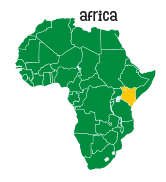
Kathonzweni
Kenya
“Having clean water means so much to this village: They need water for daily living. And then there’s the health of our children. Everyone now has clean, healthy water to drink; they can bathe more frequently; wash their clothes; and grow more vegetables to feed their families. This is so wonderful. We are able to grow crops and raise animals to sell at market.”
-Anne Odhiambo
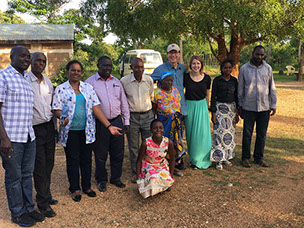
The All for Kidz Team meeting with village leaders in Kathonzweni.
Anne was born in a small village in Kathonzweni, about a 4 hour drive southeast of Nairobi. She was one of 5 children and her mother was a teacher. Every morning and evening, Anne and her siblings would head to the river. They carried hollowed out gourds with thick jute straps to fill with water and carry back to their family. Anne tearfully shared her childhood memory as she re-traced the path from her home to the river:
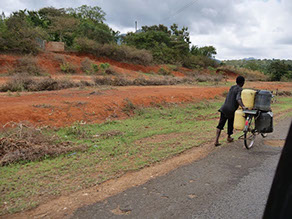
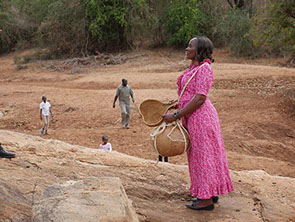 “We had no water at my home. I remember men using a shovel and digging down as deep as we could in hopes of finding water. When it rained, our hole filled up with water for just a few days. But the rains don’t come often, so most of the time we had to walk 3-4 kilometers (2-2 ½ miles) to the river for water. Every morning and every evening-we walked 2 hours for water. My gourd was heavy when full and I had to balance the weight of the water by putting the jute strap across my head, near my forehead. I was only a little girl, but I had to do it to get water for my family. Look! I still have an indent in my head from those days.”
“We had no water at my home. I remember men using a shovel and digging down as deep as we could in hopes of finding water. When it rained, our hole filled up with water for just a few days. But the rains don’t come often, so most of the time we had to walk 3-4 kilometers (2-2 ½ miles) to the river for water. Every morning and every evening-we walked 2 hours for water. My gourd was heavy when full and I had to balance the weight of the water by putting the jute strap across my head, near my forehead. I was only a little girl, but I had to do it to get water for my family. Look! I still have an indent in my head from those days.”
Anne at the dried up river.
Want to help?
If you are inspired to help with the need for clean water, we encourage you to give toward a water organization of your choosing. If you don’t know where to start, have a look at Charity: Water, Splash, and Water.org.
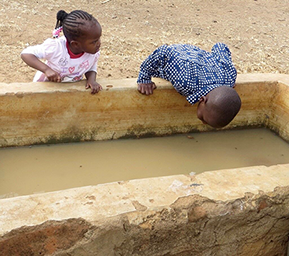
THE INSTALL: When the Drilling for Life truck arrived in Kathonzweni and was greeted by a very excited crowd of villagers. Everyone wanted to watch and help. On day 1 of drilling, the drill tapped the first water source at 200 feet (60 meters). By the end of the second day, the drilling ended with a borehole nearly 500 feet (150 meters) deep. The drilling crew estimated that this one borehole should produce as much as 500 gallons of water each hour. There was much joy among the kids and villagers as they saw and felt fresh water gushing from the ground!
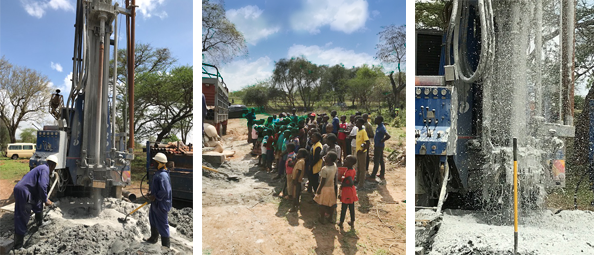
Kids need clean water.
November 2017, drilling the borehole at Kathonzweni
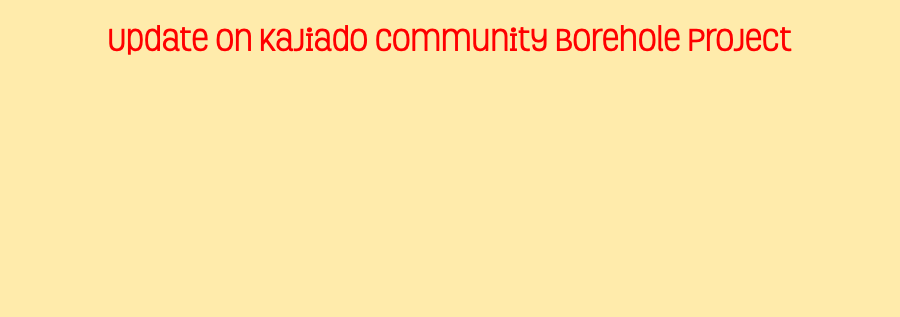
Celebrating water AGAIN, after the motor was repaired.
Our first Kindness Adventure well (in Chief Jehosaphat’s village) is currently serving 800 households with clean water after the motor and pump were repaired in 2018. The Kajiado community recently met with the National Government to discuss water problems and they have agreed to drop electrical power to the borehole site next year.
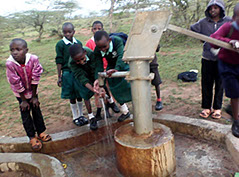
On August 12, 2016, All for KIDZ dedicated our first clean water well in Kenya. Planning had started almost a year earlier. Our Kindness Adventure team traveled 20+ hours by plane, and 3 hours by matatu (Kenyan bus) to get from Seattle, Washington to a rural village outside of Nairobi, Kenya. We were met in a village near Kajiado by Chief Jehoshaphat, some village elders and 20 children with bright smiles.

Africa
Kajiado
What a learning experience this was for all of us at All for KIDZ. When we returned home, we researched, read, and talked with experts. We lost a lot of sleep but we had a lot of hope. We realized that we could show kindness by helping the chief achieve his dream of clean water. When we shared this news with Chief Jehoshaphat, he and the village leadership eagerly signed agreement papers. If we installed the water well, the village would maintain it and never charge their people for the water.
As a first step, we hired hydrogeologists to analyze the area and determine the coordinates for the first well drilling hole (bore hole). Then, children watched as a big drill rig set up to dig the bore hole. Our kindness adventure was officially underway. The drill kept going down… 100 feet, 200 feet, 500 feet, all the way to 800 feet deep! That is like drilling down 2-1/2 football fields under the ground!
The result: no water. The hole was dry. We were a little discouraged but we remembered our team’s favorite motto: “Never Give Up!” We needed to find our growth mindset. When plan A didn’t work – we tried Plan B. We consulted with a new geological survey team that used a process developed by NASA and the University of California. With satellite imagery, they located two fractures deep beneath the village which allowed them to predict water in a new spot. Finding water is an adventurous process in itself! So we kept our fingers crossed that we would find water this time. A week later, drilling started up again with a new bore hole in the second location. On Monday, August 1st, the bore hole hit water. Everyone was SO excited. The chief and the community danced and cheered at the site of the well in Kenya. And our team rejoiced from our homes and offices in the United States. Quickly, work was completed to install a hand pump and the necessary cement work.
Our Kindness Adventure Team returned to Kajiado to visit with our friends, see the well and celebrate fresh, clean water. This time, instead of 20 villagers greeting us, we were met by Chief Jehoshaphat and the village leadership plus 250 excited children and 200 grateful villagers.
The name “Kajiado” means “the long river”
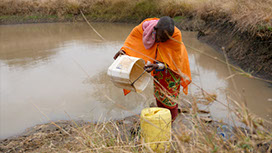 in Maasai language. However, this river only provides water for a few months after the April rains. Because of this, the village has no source of water for most of the year. It depends on a dirt pit to store some of this rain water, which they use for cooking, cleaning and drinking. We could not believe what we saw. In our own neighborhoods, we take for granted the availability of clean water.
in Maasai language. However, this river only provides water for a few months after the April rains. Because of this, the village has no source of water for most of the year. It depends on a dirt pit to store some of this rain water, which they use for cooking, cleaning and drinking. We could not believe what we saw. In our own neighborhoods, we take for granted the availability of clean water.
Chief Jehoshaphat explained that if his village had a water well to draw up water from the ground, then they would no longer fear getting sick or running out of water altogether. A well for clean water in this village would make such a difference to our new friends. This was the perfect place for a kindness adventure to begin…let’s bring clean water to Chief Jehoshaphat and his people.
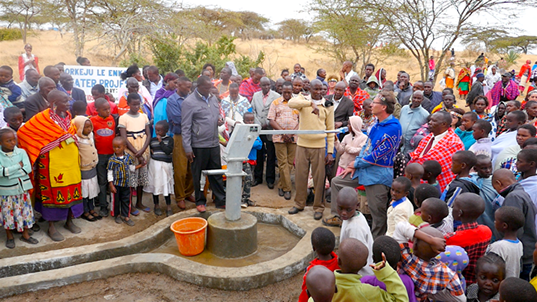
“We will do great things with clean water. We can irrigate. We will have enough water to drink, enough water to cook, and we will share it with our fellow friends in the community. Water transforms our lives.”
-Chief
Jehoshaphat
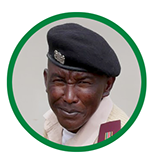
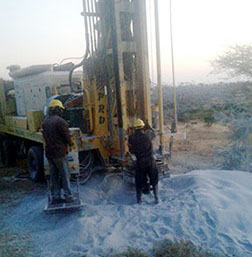
Well Type: simple borehole & pump handle
Drill Company: Majitech
GPS Coordinates: 1°50'16.8"S 36°49'18.2"E
Impact: The well is serving around 600 households and 8000 livestock in a geographical radius of 10.5 miles (17 kilometers).
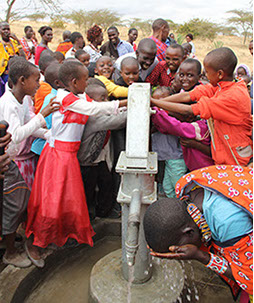
Maasai children enjoying the fresh water
Well Dedication Ceremony, August 2016
Get the latest additions to our lesson plans and resources!
We'll send occasional emails with the exciting details.
TERMS OF SERVICE PRIVACY POLICY Copyright ©2016 All for KIDZ. All Rights Reserved. The Kindness Adventure is produced by All for KIDZ,® Inc.









